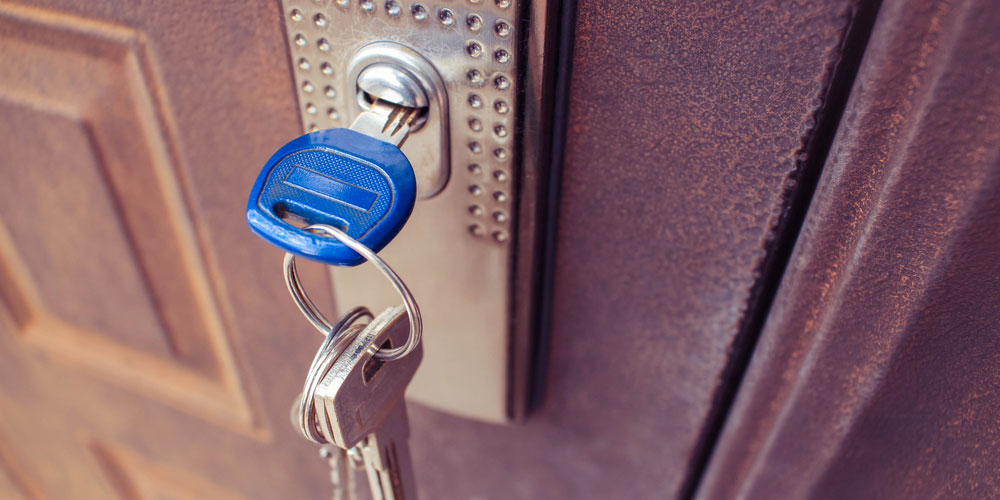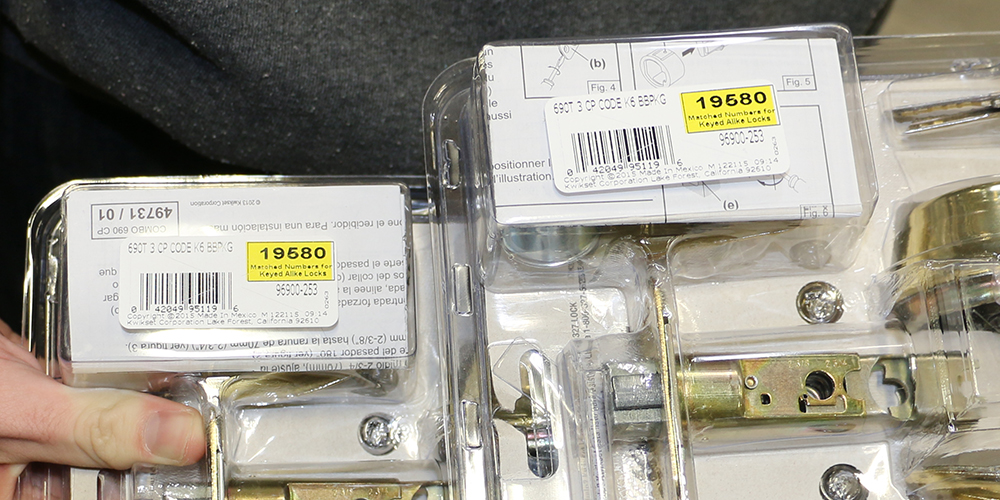Lock Blog
A resource for consumers, locksmiths, and security professionals
A resource for consumers, locksmiths, and security professionals

Are you looking for the ability to open multiple door locks with the same key? Besides investing in keypad door locks, keyed alike door locks are the standard solution you should be looking into. We will discuss how to get a hold of keyed alike locks when to use them, their strengths and weaknesses, along with answering some general questions.
The main information you need to know about keyed alike door locks is:
Any door lock that uses the same style of lock cylinder can be keyed alike. You do not have to limit the number of keyed alike door locks a building is using. You can purchase keyed alike locks by selecting locksets with the same key code. If you are attempting to make existing locks work with the same key, you can rekey locks.
Keyed alike door locks can be purchased, or existing locks can be retrofitted to be keyed alike. For purchasing, you must look for the key code on the product information, and every lock with that combination of numbers and/or letters will use the same key. In terms of retrofitting, all locks have to use the same type of cylinder so that one key profile will fit all locks.
There is no universal skeleton key that can open every type of lock. Warding, groove depth, and key size vary from product to product. You can have a master key designed to correspond to a specially built group of locks, and it will open all of the locks in that group. Every key that is not a master key will only open their given lock, but the master will open them all as if they were keyed alike.
Most master keys use patented key blanks to prevent unauthorized duplication and require a locksmith certified by the lock brand to make new keys. The certification gives locksmiths access to key blanks, replacement parts, etc., required to design and implement a master key system. With the system in place, you can differentiate levels of access between residents, employees, visitors, etc.
Keyed alike door locks offer greater convenience, which comes at the expense of security. When a door can be opened by one key, it is only secured by one key. If an unauthorized party gains access to that one key, they can open your door. And if there is an exploit or simple manipulation method, it will work in both keyways. Ultimately, you must decide what level of security you want for your property.
To open multiple door locks with the same key, you will need to determine your method of acquiring keyed alike locks. The main trade-offs will center around the price, procedural difficulty, and required tools. This information should also give you a better idea of whether this work should be left to a professional home locksmith.

Buying brand new locks is often the more expensive choice for obtaining keyed alike locks. The costs come from the price of the new lock hardware and the service cost for changing locks. However, you can decrease the cost by changing the locks yourself. Lock installation is also likely to be easier than rekeying a lock for the first time.
When you are purchasing new locks, you can take steps to ensure the locks are keyed alike. Online retailers should provide a keyed alike option, but you will need to purchase all of your locks at once. If you are buying locks at Home Depot, or similar big box stores, the products should have very prominently displayed key codes on the packaging.
The key code refers to the groove depths on the key. If two products have the same code, they are keyed alike. To open multiple door locks with the same key when you are not buying all products together, you will need to refer to documentation where this code is recorded. If you cannot find another keyed alike lock with the same code, you can still rekey your locks.
Key Takeaways:

Without installing new locks, keyed alike door locks can be attained through the process of rekeying. Rekeying a lock refers to a method of replacing the inertial components of a lock that correspond to an existing key. Most locks use a pin tumbler system, where pin stacks must be moved to a specific height for the lock to open. If you change the pin stacks of several locks to be the same, then you can open multiple locks with the same key.
The main reason to rekey rather than replace locks is to keep your existing locks. This is also less expensive than purchasing and installing new locks. The downside is that it is difficult to rekey locks yourself due to the technical nature of the task. It is not that rekeying locks is overly complicated, but small mistakes have the potential to break your lock.
To rekey a lock yourself, you will need some specialty tools and materials. Often lock rekey sets will come with a plug follower, new pins, and a new key. To make keyed alike locks with basic rekey sets, the pins included have to be the proper heights to duplicate the existing pin stack. This makes doing this work without a professional very difficult.
Key Takeaways:
In the security industry, the general rule is that gaining convenience sacrifices security. In terms of being able to open multiple door locks with the same key, you are provided the convenience of fewer keys to manage. This makes it simpler to find the right key for a given lock. But if that key is stolen or surreptitiously copied, unauthorized individuals will have a greater level of access to your property compared to a key that opens one lock.
To offset this tradeoff, you can restrict the use of keyed alike locks on doors with the same level of access. For example, all doors used to gain entry to the property (front door, back door, etc.) can use keyed alike locks. All locks used for perimeter security can be keyed alike. But you may want to vary the keys for interior doors, especially if it is a shared space with private rooms.
The underlying theory behind grouping keyed alike locks by the level of access is that only one key needs to fall for that level of security to be undermined, so let one key open every lock. There is almost no detrimental effect to your security as long as you keep all keyed alike door locks grouped together by type or level of access.
Key Takeaways:
There are several circumstances where keyed alike door locks may create more hassle than convenience. Whether or not to invest in keyed alike door locks will come down to how the property is used and the most present risks of burglary for you. The more you want to differentiate access between users, the fewer keyed alike door locks you want.
In terms of burglary risks, keyed alike door locks only increase your vulnerability to unauthorized key usage and bump keys. So if you have experienced break-ins or burglaries where there was no sign of forcible entry, keyed alike locks may not be the best option for you. If you can’t find out if your lock has been picked, this signals a key control issue that can be exacerbated by keyed alike door locks.
The convenience of keyed alike door locks cannot be overstated. Minimizing the number of keys you use saves a tremendous amount of time and effort every time you enter a property. Ease of access makes you more likely to use all of your locks, which increases your security. At the very least, you can use keyed alike door knobs and deadbolts so each door can be opened with a single key.
Though homeowners can benefit greatly from keyed alike door locks, it is even more important for commercial properties. If you are replacing commercial door locks, consider purchasing them keyed alike. Buildings using mortise locks do not need matching hardware to be keyed alike. With a simple door lock cylinder replacement, various doors can be keyed alike.
The fewer keys that need to be given to people with access to your property, the easier it is to keep track of those keys. If you are establishing physical access control, keyed alike locks are a necessity. You want to be thinking about where in a property visitors and other residents are restricted from while still giving them all the access they need.
Key Takeaways:
When you are using keyed alike door locks, how much you can vary your security will be limited. You will be using the same type of locks, which means they will all have the same type of exploits. If you are not using high-security door locks, then you are spreading the risk of your average lock throughout your property.
The most pressing threat to keyed alike door locks is unauthorized access to a key that opens several locks. Unlike installing a master key, having keyed alike door locks does not make a device more susceptible to criminal lock picking. In terms of preventing lock bumping, keyed alike door locks do not do you any favors because a on bump key profile will fit every keyed alike lock.
If you have a broken lock, replacement of one of your keyed alike door locks means having to purchase a new lock with a matching key code or rekeying the lock. The same goes for any life change that requires a lock change. Every time you have to change a lock, you have to go through this process again, or else you will lose the ability to unlock multiple locks with the same key.
Key Takeaways:
If you install keyed alike door locks, you can open multiple locks with the same key. This means fewer keys to keep track of and an easier time opening the doors you use most often. You buy keyed alike locks or have a locksmith rekey your existing locks for the same effect. With keyed alike door locks, you may run into tricky situations when one lock needs to be changed.
Keyed alike door locks are connected by the shared key they all use. That connection does not make them more secure but instead increases the shared vulnerability of the system. If an exploit is found, it undermines more than just one aspect of your security. But as long as you are balancing your security, keyed alike door locks should not put you at any greater risk of theft or burglary.
Category: Commercial, Residential, Safety & Security